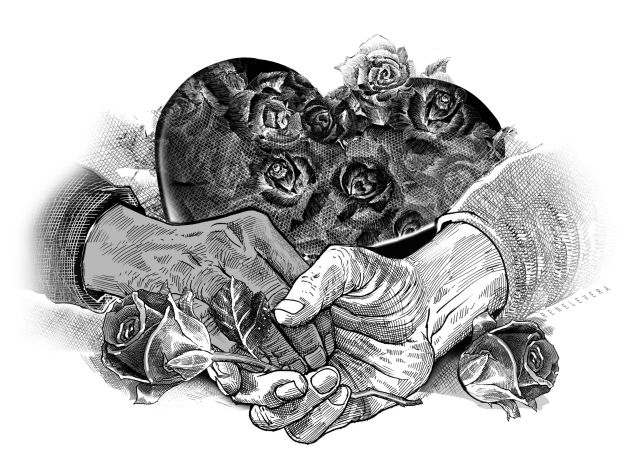
The day started inauspiciously. As usual, the clock radio came on at the morning hour set for the alarm, and a voice began to make a summary of the news. Half-asleep I only caught fragments of it, those that entered my hearing as it oscillated between sleep and wakefulness.
My need to go to the restroom put an end to my hesitation, and after I had relieved myself I switched off the outside lights and pulled the blinds to let the light in, as well as a fuller sound of crowing from a rooster I had caged in the garden. I made a mental calculation of the cock’s remaining days – in one or two weeks, I would have it butchered, its pieces boiled in a stew of diced taro roots and moringa leaves, when the son and his family came to visit and have lunch with us.
February had arrived without fanfare, but it made sure that we would not forget its appearance, with cardboard hearts hung in the malls and random remarks on the radio to remind the world that it was the season of romantic love, the cashing in on the celebration of which had somehow made it stale, and all but drained it of significance other than mere physical intimacy.
I sat down and prayed the morning prayer in the Liturgy of the Hours. A passage from one of the psalms caught my attention – “In the morning let me know your love, for I put my trust in you.” I felt that, at the beginning of every day, not just Valentine’s Day, one should greet the beloved likewise with these words, which the psalmist addressed to the Lord.
I might have had a glimpse of this love two days ago. In a coffee shop inside a mall, while the wife and I were whiling away the afternoon, a friend arrived and sat by a table next to ours. We remembered that, not too long ago, he suffered a stroke. But now we did not notice any sign of it in his speech and movement. He told us that, more than the medicines and therapy, it was his wife’s care and encouragement that brought him back to health.
When we inquired about her, seeing that he was alone, he said that she would be joining him, and to prove his point motioned towards the two cups of coffee that he had ordered, adding that, after his stroke, he would never leave the house without his wife, and would take her along even when he played golf. She piped up, having arrived during our conversation, that she would serve as his umbrella girl. (Knowing how heavy golf umbrellas were, I took a quick look at her arms, and found her biceps sufficiently packed.)
While on the elevator which took us to the basement and the parking area, I wondered what it was that sustained the love between spouses, and quickly concluded that it was their fidelity to their marital vows. As a judge, I solemnized civil marriages and had the couples declare to each other a formulation used by Roman Catholics in America: “I take you to be my lawfully wedded (husband/wife), to have and to hold, from this day forward, for better, for worse, for richer, for poorer, in sickness and in health, until death do us part.”
But then how many of the couples really understood the meaning of this? When I was practicing law, a foreigner sought my assistance in settling a legal problem. He was married to a Filipino woman, by whom he was clearly obsessed and who never left his side. Like me, he had a fondness for Bach, and naturally we hit it off and he made it a point to visit me whenever he came to the city—and this always with his wife.
One day he called on me alone, and told me that he was leaving his wife because she had breast cancer and he could not afford to pay her medical expenses. I was happy that I did not solemnize their marriage because definitely the guy had forgotten his vow to take, have and hold his wife “in sickness and in health.”
It was to this Bach-nik and his like that Jesus addressed these words, as Matthew writes in his Gospel: “Again you have heard that it was said to your ancestors, Do not take a false oath, but make good to the Lord all that you vow… Let your ‘Yes’ mean ‘Yes,’ and your ‘No’ mean ‘No.’ Anything more is from the evil one.”
Too often, because of how we mean our “Yes,” February remains the shortest month of the year.